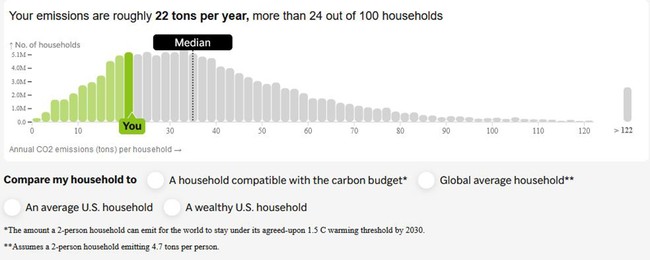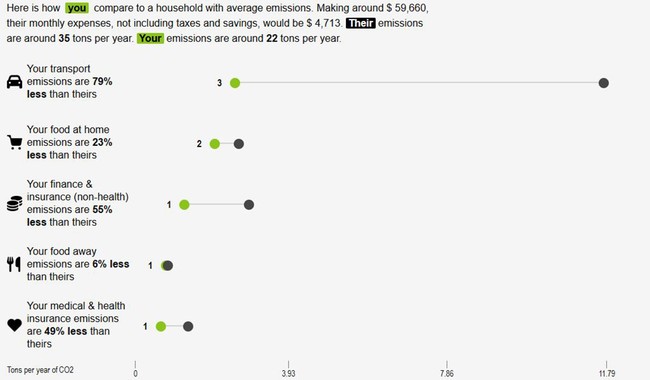Ever wondered if you could estimate your home's and family's carbon footprint? Neither have I. But now a new "carbon calculator" makes it possible to do just that. The problem is, it's a hot piece of garbage, failing to take into account some staggeringly obvious things. In the interest of accurate reporting, I took the test myself and applied it to our current Susitna Valley household.
Here's where we came out when all fields were filled in, as accurately as I could estimate them.

See Related: Hungry? Researchers Suggest Grilling Up Some Snake Steaks to Save the Planet
'EV Euphoria Is Dead': CNBC Declares Transition to Electric Vehicles Has Failed
First: The calculator's model starts with household income, blithely assuming that homes with higher incomes produce more carbon emissions than homes with lower incomes. On a global scale, this is certainly nonsense; the poor in places like sub-Saharan Africa and much of Asia, who live in poverty unimaginable to the "poor" in the United States and other modern countries, certainly produce more carbon emissions than a similarly sized family in the developed world. They may rely on wood or coal for cooking instead of the clean-burning natural gas or electricity produced by that clean natural gas - or by an even cleaner nuclear reactor. That alone sort of invalidates the initial premise of this model, which clearly states that as a key assumption (remember what happens when we assume):
Not only do upper income groups produce more emissions — they also spend on different items. For example, the top 1% spends far more on air travel, finance and their homes than other percentiles. Some of these categories, particularly air travel, have higher carbon intensities.
Second: As far as utilities are concerned, the model asks for "typical monthly spending" on two items: Natural gas and electricity. But what about the people who heat their homes with fuel oil, as is the case across much of the country? What about people with wood stoves? When I applied this test to our household, I had to put in a minimal amount to account for natural gas, and the only reason it wasn't zero was because our kitchen stove runs on propane. There is no way to account for the fuel oil we burn, or for the firewood that goes through our wood stove every winter. And there is an input for how much we spend on water - we have a well and a septic tank, we spend almost nothing on water and sewage, just the minimal electrical power required to run our well pump and the cost to have our septic tank inspected every other year or so.
Third: A big part of the calculus is "monthly spending in housing." What does that mean? Rent? Mortgage? We have no mortgage, we own our home outright (except for property taxes; not even out here in the Borough can we get away from that). So that artificially drops the input here to almost nothing on "housing," but the fact that we have no mortgage has no bearing whatsoever on our carbon outputs. And what about our transportation? We spend relatively little on gasoline because honestly, we don't go out a lot; once a month for groceries, Saturdays for lunch at our favorite place up the highway, maybe once a week to the post office. But we have a big SUV, which is well-suited for year-round Alaska driving, but aren't those supposedly notorious offenders, carbon-wise?
Here's where we came out:

Al Gore certainly isn't going to change his lifestyle based on this or any other model or calculation. Neither is John Kerry, nor is the Doom Pixie. Neither are any of the other high-income climate scolds who lecture us while on the way to their private jets to fly off to some international conference where they all pat each other on their backs as to how righteous they are.
And once again: I'll start believing there is a climate crisis when the people who keep telling me there is a climate crisis start acting like there is a climate crisis.














